On a weekend when hundreds gathered on the ESF campus to celebrate commencement, a more intimate ceremony was taking place at the College’s Lafayette Road property.
Four graduates—the first cohort of the Alfred P. Sloan Foundation Indigenous Graduate Partnership (SIGP)—marked the culmination of their program with a blanket ceremony around the fire circle at Lafayette Road Experiment Station. In the company of family, friends, and major professors, the scholars were draped in blankets to signify their accomplishment and place in their community.
“The blanket ceremony is a traditional way of bestowing honor in many indigenous communities,” said Dr. Robin Kimmerer, ’75, Distinguished Teaching Professor and Director of ESF’s Center for Native Peoples and the Environment (CNPE). “Wrapping the recipient in a beautiful blanket represents
the support and warmth of the community, and marks care and respect for the honored one.”
During the ceremony, Kimmerer spoke about each graduate’s accomplishments, especially in light of the challenges of the COVID pandemic. There was then an opportunity for others to share words about the scholars. Afterward, those gathered shared a meal catered by Angela Ferguson from the Onondaga Nation.
Jade Morning Sky Little, a member of the Oglala Lakota Nation, Tongva, and Chicana, graduated with a Master of Science in Conservation Biology with a concentration in biocultural restoration. “The blanket ceremony was a reminder of my place in this world and how I can continue to bring good medicine to community, ancestors, loved ones, friends, and my family,” she said.
The SIGP provides funding for full tuition and stipends for Native American students like Little pursuing master’s and Ph.D. degrees in diverse environmental sciences from ecology, sustainability, and conservation biology to restoration and environmental engineering. Master’s students receive a tuition waiver and a stipend of $18,000 per year of enrollment up to three years. Ph.D. students receive the tuition waiver, a full Graduate Assistantship (teaching or research) at ESF during every semester of enrollment up to four years, and a total of $40,000 over the course of their program. The funding allows students to concentrate on their studies without worrying about their finances.
“I’ll be forever grateful for this program because I could focus on my thesis. To have a program that’s focused on Natives and science is an inspiration for
me because it allows me to know there are people that will support me in whatever I want to do,” said Little.
SIGP scholars must be enrolled in an approved STEM field program, submit an annual spending plan and expenditure report, submit an academic
report at the conclusion of every semester, and complete their degree in a timely manner. They also participate in a weekly seminar that offers academic
and professional development, as well as a supportive mentoring environment with a cohort of other Sloan scholars. ESF’s graduates join a prestigious
nationwide network of Indigenous scholars.
Building on a Strong Foundation
The success of the first cohort of Sloan Scholar graduates is premised on the successes and accomplishments of the Sloan Scholars and CNPE program graduates who came before: Biidaaban Moses Reinhardt and Mariah Gladstone.
Biidaaban “Daabii” Moses Reinhardt is an Anishinaabe Ojibwe woman, a citizen of the Sault Ste. Marie Tribe of Chippewa Indians from the Upper Peninsula of Michigan. She graduated from ESF with a master’s degree in Sustainable Construction in August 2020. She is a Tribal Extension specialist with FRTEP (Federally Recognized Tribes Extension Program) at Michigan State University. She is also a freelance graphic designer with Williamson Creative Agency.
Mariah Gladstone, a Sloan Scholar, is Amskaapi Pikuni, Kainai, and Tsalagi. She was raised in Northwest Montana. She graduated from ESF with a master’s degree s in environmental science with a concentration in Coupled Natural Human Systems in 2021. Gladstone is well-known for her online cooking show, Indigikitchen which was formed to foster an appreciation and love of traditional Native foods and has branched out to support Native producers, build Indigenous gardens, and teach some of the important background surrounding the colonization of foodways. She serves on the board of the Native Youth Food Sovereignty Alliance.
The Center for Native Peoples and the Environment
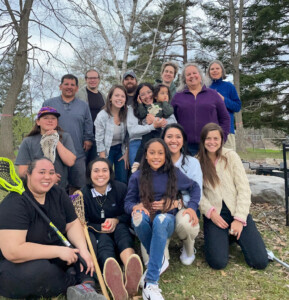
The Sloan Indigenous Graduate Fellows and faculty and staff of the CNPE gathered for a celebratory picnic to mark the end of the academic year.
PHOTO: SARAH HOWARD
Established to draw on the traditional ecological knowledge of Indigenous People and scientific ecological knowledge to support environmental sustainability, the CNPE has several outreach programs and partnerships that bring traditional ecological knowledge to the forefront.
A recent partnership between the CNPE and The Nature Conservancy (TNC) serves as a bridge between traditional ecological knowledge and Western scientific approaches. The partnership includes an $800,000 grant from TNC and has three main components: new and strengthened relationships among TNC, CNPE, and Indigenous Nations; advancement of land justice by increasing access for Indigenous Peoples to lands in their original territories; and re-story-ation.
Re-story-ation involves co-developing a new narrative on conservancy preserves that restores Indigenous Peoples’ engagement and care of their ancestral homelands and gives voices to their perspectives in interpretation, education, and stewardship practices.
In addition to land conservation, the partnership is designed to advance land justice. A 2019 UN report documented that Indigenous-held lands worldwide have better conservation outcomes than public lands, due to Indigenous stewardship practices and ethics.
Connecting with the Next Generation
For over 10 years, the CNPE has partnered with the Haudenosaunee Environmental Task Force on the Native Earth Environmental Youth Program. Native Earth has brought Native American high school students from across Indigenous Nations of the Northeast to the Adirondacks for a week of community building, reconnecting with the Earth, and deepening skills for environmental leadership.
The program includes a wide range of hands-on educational activities and workshops, from traditional and cultural skills led by respected elders to hands-on field ecology research taught by ESF scientists and students. Learning is experiential, immersive, and dynamic, with the mountains, rivers, and lakes of the Adirondacks as our classroom.
Students learn traditional cultural philosophies and practices, as well as environmental science tools that will help them care for the environment. Career exploration and college preparation are emphasized in seminar presentations, through interviews with tribal environmental professionals, and during a visit to the ESF’s Syracuse campus.
Funding is provided through a partnership with the New York State Department of Environmental Conservation. The program is free for participants and open to Native American youth in grades 9-11 throughout the Northeast region.
The CNPE also has a partnership with the Onondaga Nation School and the Youth Program at the Onondaga Nation that delivers natural history programs to the youth of the Onondaga Nation.
The Center includes a significant outreach element focused on increasing educational opportunities for Native American students in environmental sciences, research collaborations, and partnerships with Native American communities to address local environmental problems.
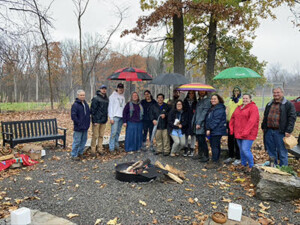
Dedication of the firepit and healing space at the Lafayette Experimental Station, with the staff of the Station, the Chestnut Project, and the Sloan cohort
Support for the CNPE
Along with the Sloan Foundation and TNC, the Center is primarily funded through philanthropic support, according to Leah Tuck, major gifts officer for
the College. Unrestricted funds are vital to the Center as they can be used at Kimmerer’s discretion towards scholarships, emerging projects, and research.
“It’s exciting that we’re getting the attention of big foundations,” s aid Tuck, “but the bulk of the unrestricted funds are from individual donors.”
Much support has come from people inspired by Kimmerer’s book Braiding Sweetgrass: Indigenous Wisdom, Scientific Knowledge, and the Teachings
of Plants, (a New York Times best seller) or who see supporting the Center as a way of making private reparations to Indigenous communities.
“I’ve certainly gotten phone calls and people directed my way because of that,” said Tuck. Looking toward the future, she noted several initiatives—including a cluster hire for Indigenous Environmental Science—that will need sustained financial support.
It is the financial support from foundations and donors that helps bring students such as Little to ESF to pursue a STEM career and environmental research.
“‘Wopila’ is the word I can think of for the Sloan program and the Center for Native Peoples and the Environment,” Little said. “‘Wopila’ is a Lakota word
for ‘thank you’ within a community. As an Indigenous woman who moved across Turtle Island to pursue a master’s degree at ESF, I am beyond grateful for the
support provided by the Sloan program and the Center for Native Peoples and the Environment. The Sloan program provided me with the financial support
to pursue a higher academic degree and, most importantly, CNPE provided me with a home away from home. CNPE became my familia and tiospaye (‘family’ in Lakota) and I will continue to make them proud en mi vida (‘my life’).

Susannah Howard
Citizen Potawatomi Nation
Master of Science in Environmental Science
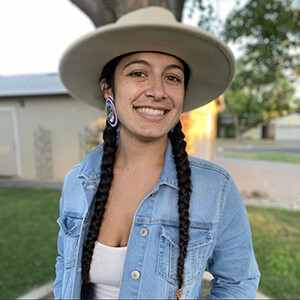
Jade Morning Sky Little
Oglala Lakota, Tongva, and Chicana
Master of Science in Conservation Biology
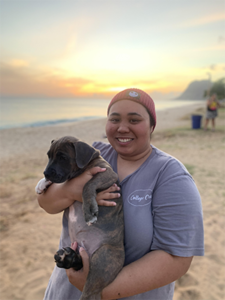
Kawainohiaakalani Navares
Native Hawai’ian (Ohana Kanaha Ame Awa Kanaka Oiwi)
Master of Professional Studies in Forest Pathology and Mycology
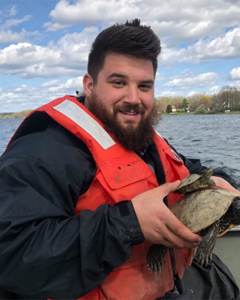
Bradley Thomas
Tuscarora Nation, Snipe Clan
Master of Science in Forestry


